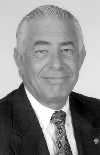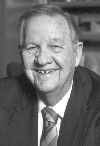Thomas H. Ball

While many leaders were instrumental in the development of the Houston Ship Channel and the Port of Houston, the contributions of Thomas H. Ball—known as the “Father of the Port of Houston”—were particularly significant.
Beginning in 1895, for four decades Mr. Ball was one of the foremost leaders in the conception and development of these facilities.
Elected to Congress in 1896, Tom Ball assumed the full burden of Houston’s deep-water dreams. He served four terms and was the only Texan on the powerful Rivers and Harbors Committee. Mr. Ball overcame fierce political opposition to funding the channel, and the deep-channel project was completed in 1914. As a private citizen, and then as general counsel for the Port Commission from 1922 to 1931, Tom Ball was a leader in resolving numerous physical, financial and institutional issues impacting channel and port development.
Tom Ball and many others, through years of service and sacrifice, made a vision come to pass in a way unequalled in America. The Port of Houston, which has grown to a 25-mile-long complex of diversified facilities, is ranked first in the United States in foreign waterborne commerce and second in total tonnage.
Wesley E. Freise

Wesley E. Freise, P.E. (Oklahoma State ’71), has been a transportation leader for three decades.
Following service with the City of Houston, Mr. Freise joined the Harris County Toll Road Authority in 1984. In 1985 Mr. Freise became executive director and served in that capacity for 15 years. He has served on the board of the International Bridge, Tunnel and Turnpike Association.
Mr. Freise provided “hands on” involvement in every aspect of toll road development. Built at a total cost in excess of $1 billion, the 85-mile Harris County system was implemented ahead of schedule and below estimated cost. The roadways, supported entirely by user revenues, are used by over one million vehicles daily and offer Harris County citizens an alternative to growing mobility problems. Segments of the system have been recognized by national professional organizations as outstanding civil engineering projects, being among the safest toll roads and effectively utilizing toll innovation.
The successful development and operation of the Harris County toll roads demonstrated the potential of these facilities to help meet mobility needs. This experience, led by Wesley Freise, resulted in significant statewide commitments to the use of toll facilities in infrastructure development.
Robert C. “Bob” Lanier

For over two decades, Bob Lanier, a graduate of The University of Texas law school, has been a major transportation leader in Texas.
From 1983 to 1987, he chaired the Texas Highway Commission. His accomplishments included securing the first gas tax increase in 13 years, developing new formulas for cost-effectively prioritizing highway funding, and initiating both the adopt-a-highway program and the now legendary “Don’t Mess with Texas” campaign.
From 1988 to 1989, Mr. Lanier served as chair of the board of the Metropolitan Transit Authority of Harris County and moved swiftly to implement many elements of the transit plan, including the 100-mile transitway system. He served as chair of both the Regional Mobility Committee of the Houston Chamber of Commerce and the Texas Good Roads/Transportation Association.
Beginning in 1991, Mr. Lanier served three terms as mayor of Houston and gave improved regional mobility major emphasis. Texas Monthly named him the second best mayor of the 20th century in Texas.
Bob Lanier’s consensus building was aimed toward making Texas mobility a nonpartisan effort. His rare combination of extensive technical knowledge and strong political skills brought a renewed dedication and sense of commitment to the development of the state’s transportation network.
Alton McDonald

Alton McDonald began his half-century career in public transportation in 1929 at the Jacksonville, Florida, Traction Company. From 1943 to 1945, he served as treasurer of National Air Lines and then returned to his first love, surface transportation.
Between 1945 and 1972, he gained national recognition for directing successful public restoration of failing private bus companies throughout the United States. In 1972, Alton McDonald founded McDonald Transit Associates in Fort Worth to assist the city with acquisition and public management of the faltering private bus company. The success of CITRAN, the city’s first public transit system, set the stage for voter approval of the Fort Worth Transportation Authority and the creation of the T. The company he founded grew into the oldest and largest independently owned transit management firm in the United States.
Prior to his retirement in 1979, Mr. McDonald chaired many committees for the American Public Transit Association and served two terms as its vice president and a member of its board of directors.
His no-nonsense, passenger-oriented approach set the standard for the transition of failing private companies into effective, responsive public transportation systems.